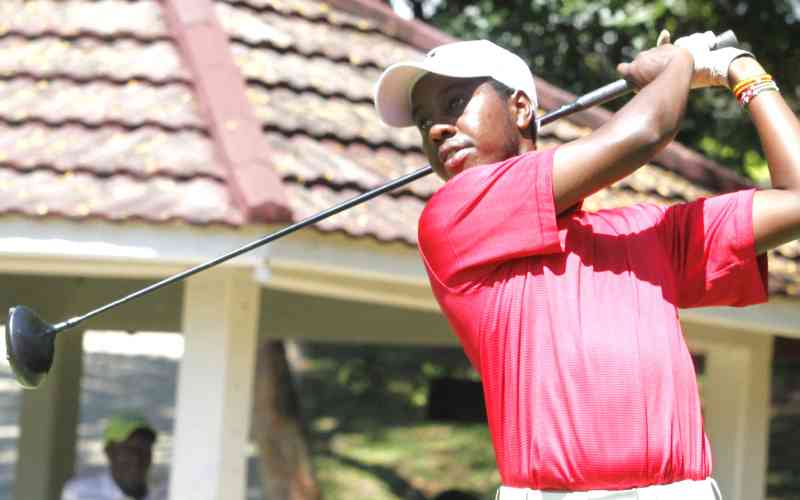Kenya: A chat with Winnie Ojanga is one with a motivational speaker, an angelic one. She walks into the venue of the interview, a hotel in Nairobi’s CBD, with elegance that is almost intimidating. But an instant reassuring smile the moment our eyes meet erases all that. Soon, we are in agreement that she and I are just regular Kenyans.
Besides English, Winnie speaks fluent Swahili and Dholuo. Once in a while, she throws in a bit of not-up-to-date sheng, but still passes her message across quite well. This is our first meeting, but it ends up looking more like a chat between old friends.
Winnie appreciates everyone. She sees beauty in everything and everyone. She effortlessly influences one to see things in her perspective. Her unspoken point is: No matter what you already know about people, there is always something good in everyone.
This is the story of an award winning Kenyan designer, mentor, philanthropist, mother and wife who has championed fashion with Kenyan touch and developed it into events that promote the image of Kenya in Europe.
Winnie, 36, was awarded the prestigious Fashion Designer of the Year 2011 in Berlin, Germany, in an event hosted by African women in Europe.
Prior to this, in 2006, she had organised the Miss Kenya (Swiss) beauty pageant that gave her a platform to motivate young Kenyan girls living in Switzerland to showcase their talents.
She has been a member of the prestigious Fashion Industry Leaders in Europe and is currently a member of the Association of Fashion Designers in Switzerland.
She has rubbed shoulders with the who is who in the field at the prestigious Charles Vogele Fashion Days in 2010 in Switzerland.
“I always had a thing for good tastes, good designs and good attire. Creativity and good taste has always been part of me,” she says.
KNOWING HER PASSION
She knew she wanted to do what she does today when she was seven.
She is also the founder and Chairperson of Ukarimu (Zurich) and Ukarimu (Kenya) projects through which her charity work is done.
In 2007, she launched her Winnie Ojanga Creations, “a beautiful label that captures femininity, elegance, class and style”.
Her collection includes handmade jewellery and evening dresses for every body type.
With this, she has found a place to express her love for the pen and pencil crayon, and the returns are good.
Stay informed. Subscribe to our newsletter
Despite knowing her passion, she did not go straight into fashion and design after school.
Even when she joined her husband in Zurich, she first tried something else.
“It took me a while to figure out what I really wanted to do when I arrived in Zürich. After the German language school, I attended the Zürich Business School for accounting and finance.”
Even after the two courses, it was clear that her calling was not in language and business. She was later to join the International School of Tourism Management in Zürich.
“After this, I took some time off for the family, had my children and used this period to explore my interest in fashion by attending the Fashion School in Zürich.
It is at this school that I met a renowned Swiss Fashion designer who inspired me to start my own fashion and creation line,” she says.
That marked the beginning of her journey to fashion and design, where her love for the pen and pencil crayons has never died.
She smiles, happy that she is where she would have loved to be.
“I started (business) small but I am now able to sell my products in various parts of Europe and the entire world. The secret of success in business is determination and nothing else,” Winnie says.
FOREIGN COUNTRY
Despite making it in a foreign country, Winnie is concerned about her motherland. In fact, she has made it a habit to come home every once in a while to offer support for children in schools, especially in Homa Bay County.
It is during one of such visits that she spares time for this interview that actually ends half way and later continues via e-mail.
“Switzerland is my adopted home and I’m very happy to be there with my family. I have my network there and this obviously favours my personal career. Being Kenyan,
I think, however, that it would be possible to grow the market here too but this would require a lot of input in terms of resources,” she explains why it has not been easy to base her core business in Kenya.
Her business relies on the Internet and other media for advertisement. “I also rely on the print media for advertisement but what has also promoted my products.
She thinks the Kenyan Fashion industry is headed in the right direction. “There are many talented designers and I am sure it is only a matter of time before their presence is felt abroad.”
“In the international scene, there are many designers of Kenyan heritage that do Kenyan designs, where Kenyan cultural and taste elements are incorporated in a creation, even when they are not very visible or famous.” And what about the Kenyan brand on the world map? “We have some Kenyan brands that have worked so hard to go beyond borders and already they are putting their work in the international market. That is very good for the industry and they must keep up the good work.”
The Government, she says, can take regulatory measures to encourage growth of the fashion industry, through incentives in school and training programmes to encourage creativity.
And it does not have to be the Government alone. Even the fact that Dorothy Nyong’o, the mother of Lupita Nyong’o, was dressed by a white woman is no big deal for Winnie, because “fashion knows no race...”
The recent Kenya Fashions Awards in Nairobi, she says, was a great thing, as “hard work should be honoured and celebrated.”
Coming from Homa Bay, a county whose HIV infection rate is high, Winnie says she has occasionally been moved to tears on learning certain things that happen to girls in her village. “I realised that poverty forces a number of girls to have sex with old men. Lack of information among the girls who contract HIV is a major problem,” she says.
When The Sunday Magazine met her recently, she was in the country for her Ukarimu Kenya project. “We aim to feed underprivileged and orphaned school going children. We provide a warm nutritious meal for participating schools twice a week to enable children to attend schools regularly.
The pilot project has been conducted successfully at Pedo Primary School in Homa Bay County for two years for over 900 children,” she says. Besides the feeding and mentoring programmes for youths, a tournament, medical camps as well as books and sanitary towel donations by her have helped to provide for the underprivileged.
Ukarimu recently partnered with a US-based organisation to provide free medical camp at Majiwa Catholic Church in Homa Bay, Orore beach in Suba and Kaswanga Primary School in Mbita.
They also donated backpacks, toys and clothes from Dielsdorf Primary School in Switzerland to Asego primary, Homa Bay Primary, Lake Primary, Yahoo Primary, Radiro Primary, Homa Bay disabled school, Shauri Yako Primary, Pedo Primary School.
She, however, says there are no strings attached to her gifts to Kenyan communities.” Doing something is better than doing nothing....The energy you give out is what you attract back into your life. I make an effort to always be positive,” she says.
 The Standard Group Plc is a
multi-media organization with investments in media platforms spanning newspaper
print operations, television, radio broadcasting, digital and online services. The
Standard Group is recognized as a leading multi-media house in Kenya with a key
influence in matters of national and international interest.
The Standard Group Plc is a
multi-media organization with investments in media platforms spanning newspaper
print operations, television, radio broadcasting, digital and online services. The
Standard Group is recognized as a leading multi-media house in Kenya with a key
influence in matters of national and international interest.
 The Standard Group Plc is a
multi-media organization with investments in media platforms spanning newspaper
print operations, television, radio broadcasting, digital and online services. The
Standard Group is recognized as a leading multi-media house in Kenya with a key
influence in matters of national and international interest.
The Standard Group Plc is a
multi-media organization with investments in media platforms spanning newspaper
print operations, television, radio broadcasting, digital and online services. The
Standard Group is recognized as a leading multi-media house in Kenya with a key
influence in matters of national and international interest.









